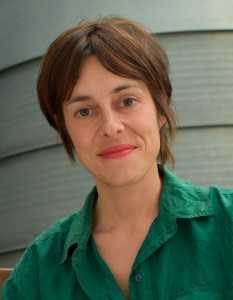RIFF - International Film Festival in Reykjavík - is now being held for the twentieth time and there are five days left of the festival. One of the films we are showing at RIFF 2023 is the award-winning 20,000 Species of Bees by Basque director Estibaliz Urresola Solaguren. It is a moving and beautiful film that deals in a heart-wrenching way about a young trans girl who grows up in the Basque Country, but the lead actress Sofía Otero won the Silver Bear at the Berlinale for her performance in the film, becoming the youngest recipient of the award in film history. We asked the director about the film and how it was to be a hit with his first film.
- In your film, 20,000 Species of Bees, you explore the story of a young girl Lucia who is undergoing an identity crisis. Could you share what inspired you to explore this topic?

I would not say that she is going through an identity crisis. She knows who she is, but what she is lacking is the strength and the skills to express it to her family. She has the feeling that what is happening to her is something that happens to many others, even if she does not know anyone personally who is going through the same situation.
But the inspiration comes from the story that happened in 2018 in the Basque country, when a 16-year-old trans-boy committed suicide. He left a letter in which he expressed his desire to expose transgender issues, as at that time in Spain they were truly neglected. Moreover, with this decision and visualisation, he was aiming to make it easier for the following generations. My hope with this film was to make his last wish come true. Also, I wanted to make this film talk not from the dark and stigmatised perspective, but rather from a more sensitive and inspiring perspective, to make the trans identities stand out as just another way of expressing human identities.
- But not only does this film explore trans identities, but also the notion of femininity. It seems that not only the title “20,000 Species of Bees” suggests that there are plenty of ways of being someone, but it also explores how femininity varies through generations and each individual. What inspired you when creating this fluid group of female characters?
In the beginning I started with interviewing a lot of families with transgender kids. Most of them were repeating the same idea, that for a long time they were trying to correct their children, trying to persuade them of their true gender. But these conversations made me question, what is the meaning of “being a woman” or “being a man”, that these adults know so well? I personally think that there is no clear answer to these questions. Womanhood is always intertwined with race, social class, and many other factors, meaning, there cannot be a generalised idea of a woman.
I wanted to gather a group of women from different generations, as they all give a different understanding of womanhood. However, what I think traverses all these different individuals is underlying shame and modesty about their appearance, their bodies, or even their desires and dreams. This is something most women inherit unconsciously. But Lucia manages to break this legacy by bringing new perspectives into her surroundings.
- Directing your first feature film and working with a young actress Sofía Otero must have been a significant undertaking. Were there any surprises or challenges that arose during the production that played a significant part in how Lucia’s character developed?
First of all, I was imagining that the character of Lucia would be a six-year-old. But then I found Sofía and she was a miracle. At first, when she came, I almost did not pick her, because she was such a different person from a character that I had created. Neither me, nor the casting director thought that she could be Lucia, and we were considering giving her a different role.
Because we were running out of time, I had to start rethinking about everything from the beginning. That made me realise that I did not give Sofía the opportunity to try playing the main character. At the very end, when I invited her for the last audition, she stood out as a completely new person. It really proved to me that we often judge people before giving them a chance to actually show up. Working with Sofía was easy from the very beginning. The only challenge that I had to overcome is trying not to diminish the freshness she could bring to the film. That was the way I wanted to work with all the kids, even if it meant that I had to treat the adults in the same way. I also chose not to give the script to kids and find a way to develop the story with them - all the shame, the conflicts, thought relationships between brothers and sisters. I almost had to develop a prequel for them so they would have a better understanding of their roles. That was also useful for me to see up to what point I could spontaneously direct them on the set.
- The setting and language of the film play an integral part in its storytelling. As a Basque filmmaker, what were the main goals you aimed for in authentically representing the Basque country on screen for an international audience?
Basque country is divided by a border into the French Basque and the Spanish Basque. This division, that is also present in the language, reminded me of the binary division we have in our society, between what is seen as normal and what is seen as the other. This was very significant for me, because I am basque myself and this identity is important for our family. But one of the most beautiful things that I find about the basque language is that the third person is non-gendered, the same way as the adjectives can refer to someone non-binary. Because of the basque language, Lucia has the possibility to express herself in a symbolic and liberated way. She usually talks in that way with other kids and with the great aunt.
I feel like the character of the great aunt also shares something with Lucia that relates to her identity. Perhaps they share the difficulty of fully expressing themselves, or loving people they wish to love. They understand each other and that reflects in the language. Moreover, in the basque culture bees play an extremely important role, signifying a sacred animal. Since Lucia and her great aunt bond over bees, that gave me a chance to create a relationship between them, deeper than the sociocultural level.
- Does the success of your debut film alter the way you want to approach filmmaking in the future?
I think it puts a lot of pressure on me as a filmmaker. It caught me completely off guard when I gained such recognition at Berlinale. Everything has been so big and unexpected to me, that I almost feel like I have fallen into a vertigo. Now I feel like I have a big brother's eye, looking at me from above, following each of my moves. But I really hope I will be able to produce films in the same way I have been so far. I believe that we need to reshape this industry from its core, because we have to make it more sustainable. We have to rethink the processes and rethink the ways of hierarchies and what so. I hope that now I have the chance to play my part and help this change happen.
- Also, can you give us insights into the topics you are interested in exploring in your upcoming films?
Nature, ecology, feminism, the tension between society and individual autonomy – these are the topics that I am always drawn to. And I always try to speak about sustainability and the faults of capitalistic lifestyles in my films. I noticed that we approach life as if it is something that always has to grow and that makes me believe that perhaps my second film shouldn’t be bigger in budget or production. Perhaps, we should allow ourselves to explore more, to give space for ourselves and others to speak up. And that’s why with my films I wish to inspire tolerance for diversity that is undoubtedly fundamental for our society.
20,000 Species of Bees / 20.000 tegundir býflugna / 20.000 especies de abejas
Estibaliz Urresola Solaguren, ES, 2023, 129 min
Berlinale Silver Bear: Besti aðalleikari / Best Leading Performance
7.10. @ Háskólabíó 2 – 11:00 – Tickets can be purchased here
8.10. @ Háskólabíó 2 – 18:30 – Tickets can be purchased here
A stirring coming-of-age story about a girl exploring her gender identity among a Basque beekeeping matriarchy, featuring an astonishing performance from the youngest Silver Bear winner in history.










